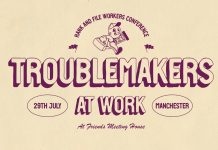Kevin Crane responds to Ian A‘s article ‘Anger, confidence, fear and hope in the workplace‘, arguing that the nature of precariousness at work needs to be taken seriously.

Many of the things Ian has written are perfectly sensible and may, for some readers, be urgent matters. I think, however, that in stressing certain useful points, he has arguably over-generalised some concepts that are not universal and that are, to varying degrees, not as relevant for socialists in all areas of life and work.
The area where I would stress most caution is Ian’s arguments about the change of mood stemming from, as he identifies it, the return of mass unemployment in the 1970s. Ian focuses on some of the arguments that have been used since that time both to justify and explain the decline in trade union and strike action since those days. However, in doing so, he comes very close to understating how real that decline has been. Employers “lose” more employee time on toilet breaks than on strikes. The vast majority of days of strike action in Britain today are accounted for by public sector workers on large, highly co-ordinated one day actions. For increasing numbers of working class people, the strike is a foreign experience and not a lived reality.
The first argument Ian takes on, viability, I think is less relevant than it would have been a generation ago. Companies tend to use viability as an excuse for not paying taxes today, more than for wage disputes, as there are simply very few of these in the private sector. Much more problematic is Ian’s next target: the question of precariousness. He is far too glib about this question, one that the organised left in Britain has been struggling to adapt to for at least my own adult life (1999 onward, since you ask).
Ian attempts to dismiss talk of specifically precarious workers in two ways. The first is to claim that the “fear” that they experience of being laid off if they attempt organise is overstated. Not only do I dispute this, I dispute that fear is the best word to describe the psychological factor that is at stake. I think Ian’s emphasis fails to understand the disposable nature of much modern employment. Today’s disposability is actually double-edged: employers think “I can get more of these losers any day”, while employees often think “This job’s crap anyway”. They are utterly uninvested in the jobs, and utterly fatalistic, about whether or not they keep them. For a lot of workers, and this is more true the younger they are, jacking a job in and taking their chances elsewhere is by far more natural an option than attempting to fight an issue – whether that be pay, conditions or maltreatment.
The second of Ian’s arguments about precariousness, concerning the legal status of workers, is also an error in my view. Ian uses the fact that modern employment legislation regulating the “full time job” is relatively young as law goes, dating only from 1971, to suggest that prior to this we must all have been precarious. This isn’t a good argument at all – the 1970s saw the peak of the process of mass industrialisation and the concentration of more and more labour in ever larger and more sprawling complexes of massive workplaces. Ian himself briefly touches on this in his own article: it is generally referred to in popular history as “full employment” – within reason, if you could walk upright, you were never precarious! A generation and half of neoliberalism and globalisation has left this world far behind: British capitalism now grows on a very different model. Manufacturing has either been made so labour un-intensive that it has become invisible, or it has been safely transposed to the Global South. I am fond of quoting the fun fact that we are back at “peak car”, i.e. there are as many cars built in Britain per year as there ever were; but how many people are employed in that industry now and what is their social weight? Does it in any way resemble the force in society that car workers were in the 1960s and 1970s? Recall the stunning camera phone footage of casualised Mini workers being herded out of the Oxford Cowley plant in 2009, by their own union reps. To deny modern precarity is fundamentally wrong to me. We need to recognise it and respond to the challenge.
This is not just nit-picking. There are real implications for the conclusions that socialists, and socialist organisation, must draw from the present state and shape of the working class. Ian is right to say that where workers are engaged in struggles of the organised labour type, the engaging correctly with them is critical.
It would be a severe form of narrow mindedness to denounce the large scale, testimonial and protest style strike actions that the public sector unions have at least kept an opposition to austerity alive, particularly after the richly deserved fall of Michael Gove. If the NUT hadn’t utilised its ability to pull masses of teachers out on strike I doubt the coalition of opinion that destroyed him would have coalesced in the same way. Nonetheless, the big unions are utterly conservative about what they can achieve with strike action. Even the relatively leftwing leadership of Unite do not believe they can hold together their cash-poor, debt-obligated membership through significant bouts of strike action, in an era when increasing numbers of people barely have enough cash to get them through the month. Under such circumstances: yes, socialists in these workplaces need to argue the big picture and build on the enthusiasm that we have seen the big strikes bring out in such workers to its full effect.
However, the above strategy is concerned with a relatively small and declining group of workers, and an even smaller group of socialists. For those that do not get into the public sector, Ian’s advised courses of action suffer serious strategic limitations. For starters, if the way we recruit socialists is to take people from work to give workplace collections to picket lines, we will not recruit a lot of socialists. There are not very many picket lines to go round, and the popular awareness and understanding of them, particularly for the young, simply isn’t there. It is not a good way into left politics for many young working class people.
Further to this, for many younger socialists, a strategic orientation in building in one workplace over a long period of time may be an unrealistic way to try and organise. Many younger workers are not in any particular employment for very long at all. And the category of ‘younger’ is starting to get seriously stretched: many people under 40 no longer believe in “jobs for life”. Staying in one job for a significant length of time, from a purely career point of view, is often now frowned upon as (perhaps oddly) lazy. Even if some younger workers deliberately stay in particular workplaces for lengths of time – ideologically and with a view to building organisation – they may simply see a lot of their peers who they get politically close to come and go as they transition through their impermanent jobs. You can’t wish away the realities of how life is lived today, and you cannot build organisation in any shape your ideology might desire – organisation must fit the space which it is attempting to fit.
It is for this reason that I think it’s a mistake that Ian mentions Unite Community only in passing. I think there is strong evidence that it can form the basis of the new kinds of organisation that we should be looking to. Unite, along with other unions, notably NUT and TSSA, has been looking very positively at some of the excellent work in the field of social movement trade unionism. We have seen this make significant strides in parts of the USA, though it is not limited to that country. Social movement trade unionism recognises that the struggle for working class people’s rights in the system has gone beyond what could previously have been understood simply as labour or workplace struggle. The progressive shift of workers’ livelihoods onto the social wage and the undermining of the industrial “job for life” has necessarily changed the ways that many, if not all battles are fought. The Fast Food Rights campaign in America involves the unions, but relies on mobilisation and engagement from far wider layers of people – including residential and faith groups to protest the disposable treatment of fast food workers. Living wage campaigns, including here in London, similarly involve the unions with other forms of voluntary organisation to win their demands. In many cities (particularly London!) these are now benefiting more workers, at lower ends of the pay-scale, than conventional industrial organisation. The experience of the Chicago teachers is one that the NUT in particular has been keen to reproduce. These represent some significant blows against the neoliberal agenda, and should at least be understood by socialists.
To go beyond a mere battle for reforms, however, and look at the big picture of the great forces in society, I think it would be unwise for anyone who calls themselves a “revolutionary” to limit their conception of agencies that can act in revolutionary ways to those that can be called organised labour. I caution anyone reaching for their NUM commemorative badges and crying treachery to remember that “union labour” was not only never synonymous with “working class”, it was never the majority of the working class worldwide. It is entirely legitimate for socialists, and yes – Marxists, to look at the potential agency of other sections, even if they discover that the prospects for these groups are limited. In this spirit, a debate David Harvey opened up a few years ago is worth revisiting here: the last time a British government was driven into collapse as a direct result of class struggle (which is not a synonym for “strike action”) was the aftermath of the Anti-Poll Tax Movement: an out-of-the-workplace campaign of non-payment and civil disobedience. I think the fact that in this new, and more terrible, Tory government, no attack on working class conditions has been as universal and unifying as the poll tax shows that our enemies learned the power of working class social movements. We should too.



















A picture credit please, ta. Steve.
In response to Sparky’s point about reviving the politics of Cliff & Gluckstein on the bureaucracy and the rank and file, an rs21 member has transcribed their classic book on the subject which is now on the Marxist Internet Archive:
http://www.marxists.org/archive/cliff/works/1986/tradeunion/index.htm
The 1970’s marked the end of full employment NOT the beginning. By 1976 there were over 1 million unemployed and in 1984 at the beginning of the miners strike there were over 3 million on the dole. So called ‘precarious’ work has been with us in varying degrees since the beginnings of the capitalist mode of production and however inclusively we want to talk about the working class it is nevertheless a reality that some workers have more economic power than others. The enduring reality in over 300 years of capitalist development is that composition (by activity) of the working class has been in a constant state of change to the extent that by the mid-1950’s the level of ‘white collar’ employment was more or less the same as manual employment in virtually every advanced industrial economy. At the same time the rate of union growth among non-manual workers by far outstripped the rates of growth among manual workers of the preceeding century. Some useful observations but I think the core of Ian’s thesis still holds good.
The danger is just looking at the unattractive low level of struggle and thinking we need to concentrate on something else.
The reason why the workplace is seen as central is because this is where we have most power. The electricians beat back multi-national companies like Balfour Beatty a few years ago.
Of course Kevin is right we have to be alive where Socialists can be recruited and how successful campaigns can feed into a fightback.
But strikes are not just about immediate recruitment, they are the training ground for revolutionaries of the future.
The biggest strike wave in history started in France in 1968 (sparked by student protest) when some were trying to argue that the working class was finished.
New groups of workers can suddenly come to the fore, nobody would have put money on the Match Girls starting a big upsurge in class struggle in 1888.
The argument about precarious jobs, of course it is true the scene has changed dramatically, but that was not something that was pre-ordained. It was because the bosses were no longer making big enough profits that a major clash with rank and file workers occurred – which our side won, with the miners forcing the Tory government out in 1974. It was “left wing” leaders like Jones and Scanlon who allowed the bosses to slash jobs and introduce the social contrick lowering workers living standards.
In todays economic crisis there again is not a lot of difference between the left and right of the Trade Union Bureaucracy.
The SWP created this “new times” theory that the Trade Union leaders want to fight but lack confidence. There is no evidence to support this, (if any body else comes up with new theories it is heresy apparently).
Of course we should support action called by Union leaders, but we cannot expect anything positive in an economic crisis to come from above, we have to build from below.
The politics of Cliff and Trotsky on the Bureaucracy need to be revived, not discarded.
“It takes a view that young workers are not interested or can’t be [won] to supporting public sector strikes.” – Perhaps you could actually quote Kevin Crane’s words to back up this bizarre assertion.
“This was of course argued by Renton that young workers in say a call centre will not support teachers and lecturers.” – Perhaps you could actually link to David Renton’s words to back up this bizarre assertion.
Very poor response to Ian’s interesting article. It takes a view that young workers are not interested or can’t be own to supporting public sector strikes. This was of course argued by Renton that young workers in say a call centre will not support teachers and lecturers. This is such a reactionary argument that it really needs challenging. Firstly there are young workers in the public sector, witness the teachers demonstrations! Secondly all the indications are for huge public support when public sector workers take strike action. To think UNITE community branches are this wonderful new way of organising is to massively over estimate them. History has also indicated that working class organisation yes needs time to be built but in certain situations can be done so very quickly so the point about young workers not hanging around and so are not interested in building workplace organisation is massive over estimation of the restructuring of the working class and appears to be a shift away from the focus of working class as the key social force for change. It has a whiff of marxism today!